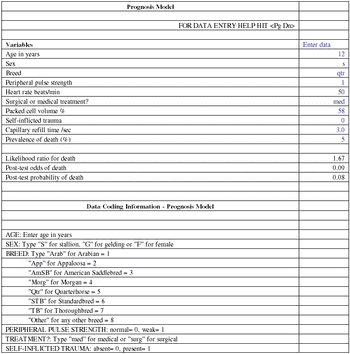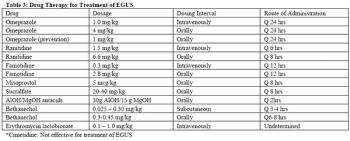
Frank M. Andrews, DVM, MS, DACVIM
Articles by Frank M. Andrews, DVM, MS, DACVIM


Equine Cushings Disease (Pituitary Pars Intermedia Dysfunction [PPID]) is a disorder that likely affects more than half the population of horses aged 14 years and older. If unmanaged, affected horses are at risk for laminitis and insulin resistance (IR) and are immune-suppressed, increasing their risk of numerous infections.

Fermentation in the hindgut of the horse is similar to that in the rumen, resulting in the production of short-chain volatile fatty acids mainly acetic, propionic and butyric acids. The proportions of these acids are influenced by the availability and type of substrate, composition of the microbial community and the hindgut physiologic conditions.

Equine gastric ulcer syndrome (EGUS) is common in performance horses and in foals. Diagnosis of EGUS is based on history, clinical signs, endoscopic examination, and response to treatment. All ages and breeds of horses are susceptible to EGUS and current therapeutic strategies focus on blocking gastric acid secretion and raising stomach pH.

Deciding when to refer a horse with colic can be a difficult decision and involves careful evaluation of clinical and laboratory parameters, surgical considerations, probability of survival, and other considerations that include worsening of clinical condition, unresolved pain, or to obtain a second opinion.

Unlike EGUS, colonic ulcers and the condition Right Dorsal Colitis (RDC) occur less frequently, but may lead to hypoproteinemia and more severe clinical signs. In a necroscopic study of 545 horses, 44% of non-performance horses and 65% of the performance horses had colonic ulcers.
Latest Updated Articles
 Colic cases and probabilities (Proceedings)
Colic cases and probabilities (Proceedings)Published: August 1st 2011 | Updated:
 Equine Cushings disease: new developments to an old disease! (Proceedings)
Equine Cushings disease: new developments to an old disease! (Proceedings)Published: August 1st 2011 | Updated:
 Colonic acidosis (Proceedings)
Colonic acidosis (Proceedings)Published: August 1st 2011 | Updated:
 Gastric ulcers: a pain in the gut! (Proceedings)
Gastric ulcers: a pain in the gut! (Proceedings)Published: August 1st 2011 | Updated:
 Colic: when should I refer this horse? (Proceedings)
Colic: when should I refer this horse? (Proceedings)Published: August 1st 2011 | Updated:
 Right dorsal colitis: a pain the In hindgut (Proceedings)
Right dorsal colitis: a pain the In hindgut (Proceedings)Published: August 1st 2011 | Updated:
